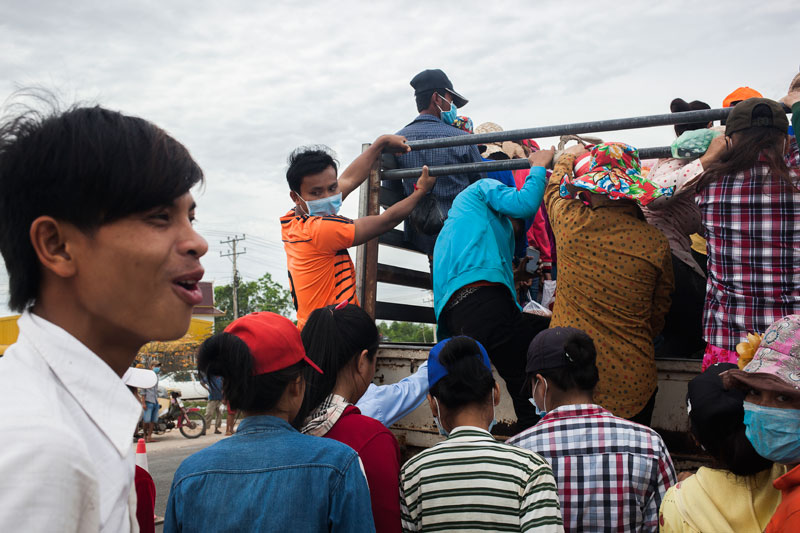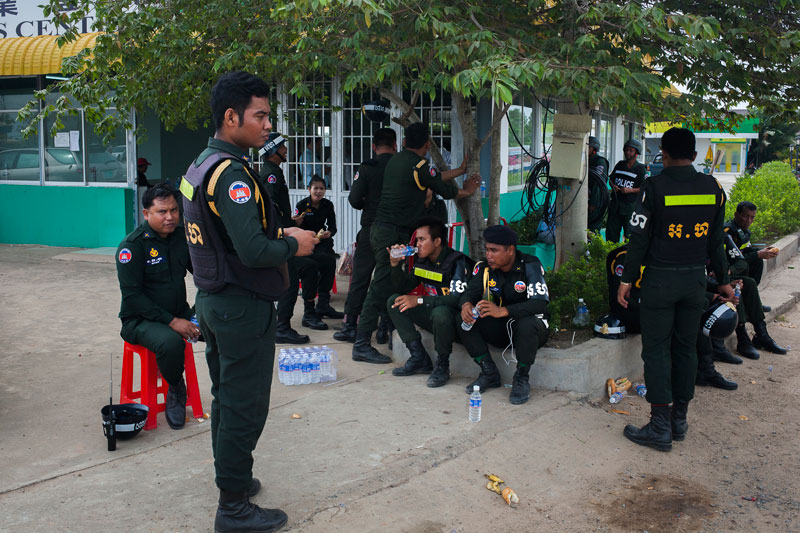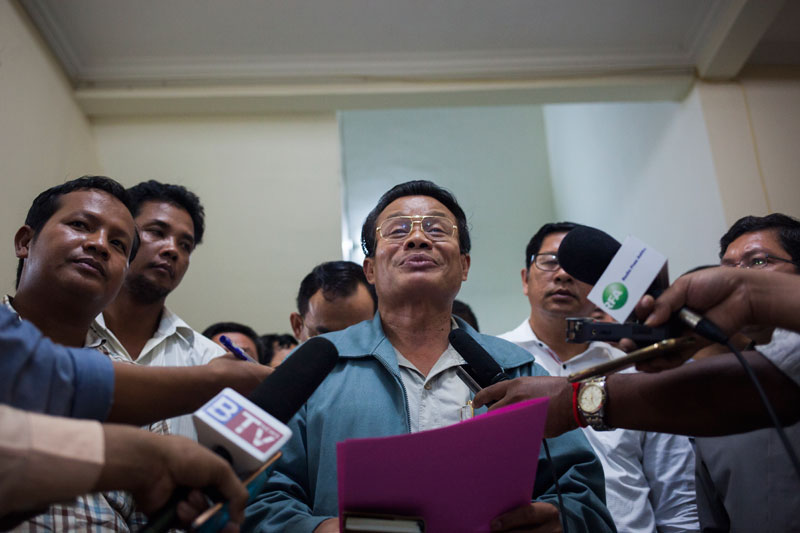BAVET CITY, Svay Rieng province – More than 30,000 workers were evacuated from two special economic zones (SEZs) here Tuesday morning after police clashed with an unruly mob attempting to incite workers to join their call for higher wages.
The mob, which began as a few dozen and quickly grew to a few hundred, tore through the Manhattan SEZ shortly after the workday commenced at 7 a.m., throwing stones at factories and shouting for those inside to abandon their stations, as the latest bout of unrest in this industrial hub rolled into its sixth day.

Rex Lee, a Taiwanese administrator at the Manhattan SEZ, which houses 28 factories employing some 24,000 workers, said plant managers decided to send staff home because the protests had threatened to spiral into madness. He said that millions of dollars were being lost every day due to the work stoppages.
“It is for the safety of the peaceful workers,” Mr. Lee said at the SEZ as the last of the workers trickled out.
Prominent local union leaders have denied involvement in the strikes that began last Wednesday, but were nonetheless summoned Tuesday afternoon to a meeting with police, government officials and factory representatives at Bavet City Hall. Four union bosses agreed in writing to call for workers to cease their violent actions in exchange for the release of four protesters who were jailed last week.
“Regarding the arrest of the four workers, the request of the unions is accepted by the provincial administration, but this release is on bail conditions and needs to follow judicial procedure,” deputy provincial governor Hou Rattanak said after the four-hour meeting.
“Wages and other benefits during the strike are being discussed by the employers,” he added, going on to hug union leader Pav Sina and refusing to answer questions from reporters.
Mr. Sina, head of the Collective Union of Movement of Workers (CUMW)—which claims about 2,000 Manhattan SEZ workers as members on top of roughly 8,000 from the nearby Tai Seng SEZ—said the protesters had not been acting on his instructions, but pledged to take measures to cool the situation.
“We don’t expect [to end the strike] fully because we can not satisfy 10,000 people…but we will try to prevent a mass strike,” Mr. Sina said. “We will appeal partly to reduce their anger and remove violence from the picture.”

Despite unions denying involvement in the strikes, Bavet City governor Seng Seila said the manner in which protests had popped up in different places over the past week left him with no doubt that someone was pulling strings.
“You see, the strike starts in one [SEZ] and then when we move the P.M. [military police] to focus there, the strike starts in another place. On Tuesday, it was Tai Seng, today its Manhattan,” he said. “I conclude that someone is creating this scenario.”
Mr. Seila also said that one striker “was arrested during the attack,” but declined to give details.
Mr. Lee, the Manhattan SEZ administrator, took reporters on a tour of the sprawling industrial park along the trail of destruction—mainly broken windows and scattered rocks—that the mob had left behind.
“Most of our workers are good, peaceful workers, and we need to protect them from this small group of troublemakers,” he said, adding that he was not certain that the “troublemakers” were even employees.
“They could be outsiders,” he said.
Mr. Lee said the mob initially targeted a single factory—Elite, with more than 3,000 workers—when a clash ensued after police brought in two fire trucks to disperse protesters with their powerful hoses.
“The workers broke the front window [of one of the trucks],” he said.
Nath Sarith, a 28-year-old garment worker, said his factory was operating as normal Tuesday until about 9 a.m., when management dismissed staff. When he walked outside, he witnessed a violent clash between protesters and police, he said.
“Police and especially military police used electric batons and a water truck to fight with the violent workers, who had no weapons, just their hands,” he said. “When other non-violent workers saw this, they joined the fight to help them.”

Earlier in the day, Kim Sok Sangvath, a provincial military police official, was overheard asking a manager at the Manhattan SEZ for “donations,” claiming that three of his men had been injured and that “some” protesters had been arrested.
However, Ser Vuthy, chief of the provincial military police, said last night that no arrests were made Tuesday.
“They fought us. Why would you ask me that? We didn’t arrest any of them,” he said by telephone.
Inside the Manhattan compound at lunchtime, scores of police swung in hammocks and played cards as the last of the workers were carted home on trucks.
Mr. Lee said hundreds of officers had been stationed on-site around the clock since the strikes began last week. He said the police response had been satisfactory—and that the Manhattan SEZ had provided them with lunchboxes, bottled water and dinner—but added that more would have to be done to bring an end to the industrial strife.
Similar action snowballed in April 2014, when the government shut down all factories in Bavet City for a number of days, and in December 2013, when a revolt in the city presaged the nationwide strikes that came to an end when military police shot dead at least five workers during a riot in Phnom Penh.
“Yesterday, some troublemakers were arrested, but today, it’s still raining stones,” Mr. Lee said, referring to 58 workers taken into custody on Monday and then released after agreeing not to participate in violent strikes.
“We won’t say that everyone must be in jail, but some violent people must get punished. We need to find the troublemakers,” he said.
“If they don’t get punished, what happens next time? It takes just 200 bad people and 20,000 people lose their job or their wage. Is that fair?”



